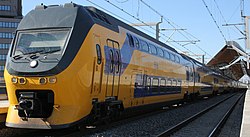Dutch Railways
 |
|
| State-owned company | |
| Industry | Rail transport |
| Founded | 1938 |
| Headquarters | Utrecht, Netherlands |
|
Key people
|
Roger van Boxtel (CEO) |
| Products | Rail transport, rail construction, services |
| Revenue |
|
|
|
|
|
Number of employees
|
34,000 (2015) |
| Parent | State of the Netherlands |
| Subsidiaries |
Abellio Abellio Greater Anglia Serco-Abellio 50% Merseyrail 50% Abellio ScotRail Nedkoleje Qbuzz (100%) NSRegio (99%) |
| Website | www.ns.nl |

Railway tracks in the Netherlands (2013)
|
|

|
|
| Locale | Netherlands |
|---|---|
| Dates of operation | 1938–present |
| Predecessor |
Hollandsche IJzeren Spoorweg-Maatschappij (HSM) Maatschappij tot Exploitatie van Staatsspoorwegen (SS), |
| Track gauge | 1,435 mm (4 ft 8 1⁄2 in) standard gauge |
| Headquarters | Utrecht |
| Website | www.ns.nl |
Nederlandse Spoorwegen (Dutch pronunciation: [ˈneːdərlɑntsə ˈspoːrʋeːɣə(n)]) (English: Dutch Railways) or NS is the principal passenger railway operator in the Netherlands. NS provides rail services on the Dutch main rail network (hoofdrailnet). The rail infrastructure is maintained by network manager ProRail, which was split off from NS in 2003. Freight services, formerly operated by NS Cargo, merged with the DB Schenker group in 2000.
NS runs 4,800 scheduled domestic trains a day, serving 1.1 million passengers. Also, NS provides international rail services from the Netherlands to other European destinations and carries out concessions on some foreign rail markets through its subsidiary Abellio.
The NS was founded in 1938 when the two largest Dutch railway companies, the Hollandsche IJzeren Spoorweg-Maatschappij (HSM) and the Maatschappij tot Exploitatie van Staatsspoorwegen (SS), formally merged. These two companies had already been intensively cooperating as early as 1917. There were both economic and ideological reasons for the cooperation.
As a result of the First World War, the Dutch economy had declined causing HSM and SS to fall from profitability. Given their national importance, allowing them to slip into bankruptcy was not considered acceptable. While remaining independent companies, HSM and SS improved overall efficiency by cooperatively integrating their operations. The Dutch government further supported HSM and SS by purchasing shares in both firms. In 1938, the government merged the two companies to form the Nederlandse Spoorwegen (NS). In the process, the government bought all remaining shares, yet never nationalized the company. Therefore, NS remained, and still is, a private company solely owned by the Dutch government.
During the Second World War the NS remained an independent company, but was forced to do the Germans' bidding; NS was forced to construct the railway lines to camp Westerbork and help in the deportation of almost a hundred thousand Jews to extermination camps. The NS went on a strike once during the war, in the winter of 1944-45, after it had declined to participate in one a year earlier.
...
Wikipedia
